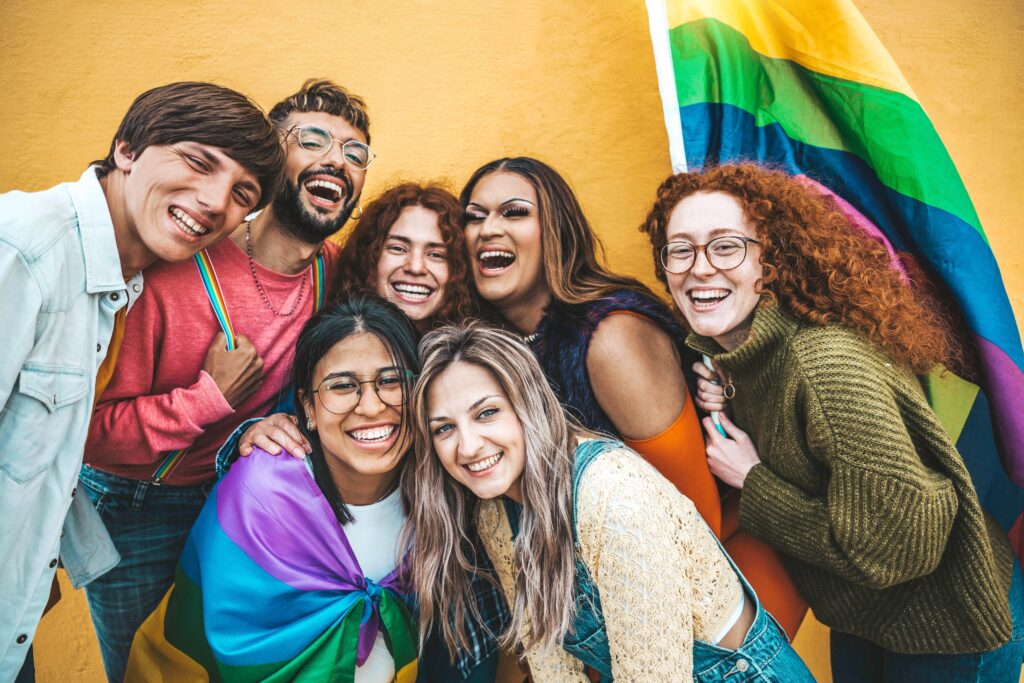Worldwide, LGBTQ rights have made big strides in recent decades. For instance, between 1990 and 2023, the number of countries criminalizing private, consensual same-sex relationships dropped from 113 to 64. Moreover, marriage equality now exists in 36 countries. And despite challenges to transgender rights, there have been positive developments, such as 26 states explicitly covering transgender-related health care.
These achievements are the result of extensive advocacy and legislative efforts. The International Day Against Homophobia, Biphobia, and Transphobia (IDAHOBIT) serves as a platform to raise awareness of these achievements and address ongoing violations against LGBTQ rights.
IDAHOBIT happens annually on May 17th. In observance of this day, we delve into its origins, underscore its significance, and consider its future implications.
Need substance abuse treatment? Call La Fuente at 888.903.9898.
What Is IDAHOBIT?
The International Day Against Homophobia, Transphobia, and Biphobia (IDAHOBIT) is a global initiative to raise awareness about the discrimination, violence, and challenges the LGBTQ community faces.
Initially organized by a central International Day Against Homophobia (IDAHO) Committee, it’s now collaboratively managed by regional and thematic groups in more than 130 countries. Celebrations vary and include everything from workshops and discussions to parades and potluck socials.
Together, these events promote the rights of individuals with diverse sexual orientations, gender identities or expressions, and sex characteristics.
In addition to local and regional support, IDAHOBIT has received official recognition from several countries and international institutions, including the European Parliament and several United Nations agencies.
When Is IDAHOBIT?
IDAHOBIT is celebrated annually on May 17th. This date is significant as it marks the anniversary of the World Health Organization’s 1990 decision to remove homosexuality from the International Classification of Diseases and Related Health Problems. This was a landmark moment for the queer community, as it signaled an end to the pathologization of homosexuality.
History of IDAHOBIT
The idea of IDAHOBIT emerged in 2004 to spotlight the violence and discrimination queer individuals face daily.
Its first official celebration took place on May 17, 2005. In the lead-up to this event, over 20,000 organizations and individuals, including major players like the International Lesbian and Gay Association (ILGA) and the International Gay and Lesbian Human Rights Commission (IGLHRC), showed support for the “IDAHO initiative.” This sparked LGBTQ activities worldwide, including in countries openly hostile to the community.
Over the years, the initiative has expanded and become more inclusive. For instance, transphobia was added in 2011, forming the acronym IDAHOT. In 2018, biphobia and intersex discrimination were added, leading to the current acronym. The latest change occurred in 2022, renaming May 17th as the Day Against LGBTQIA+ Discrimination to include lesbian, queer, and asexual community members.
IDAHOBIT 2024 Theme
The theme for IDAHOBIT 2024 is: “No one left behind: equality, freedom and justice for all.”
It holds particular significance, as December 2023 marked the 75th anniversary of the Universal Declaration of Human Rights.
While the declaration aimed to establish shared values for humanity, the reality is that the ideal “All human beings are born free and equal in dignity and rights” remains elusive, especially for millions of LGBTQ individuals worldwide.
Against this backdrop, this year’s theme emphasizes unity. It serves as a rallying cry for solidarity. Only by standing together can we way build a world free from injustice, where no one is marginalized or left behind.
IDAHOBIT Celebrations Around Los Angeles
Join La Fuente Hollywood Treatment Center in commemorating IDAHOBIT if you’re in the Los Angeles area.
La Fuente is one of the country’s leading treatment centers dedicated solely to treating members of the LGBTQ community. We’ve been proudly serving the community since 2005.
In addition to our residential and outpatient treatment programs, we’re deeply committed to building community connections through local service projects, philanthropy, and civic engagement. We believe that active community involvement is crucial for our clients’ long-term success.
For more information about our efforts to improve the lives of LGBTQ individuals, contact us at 888.903.9898.




